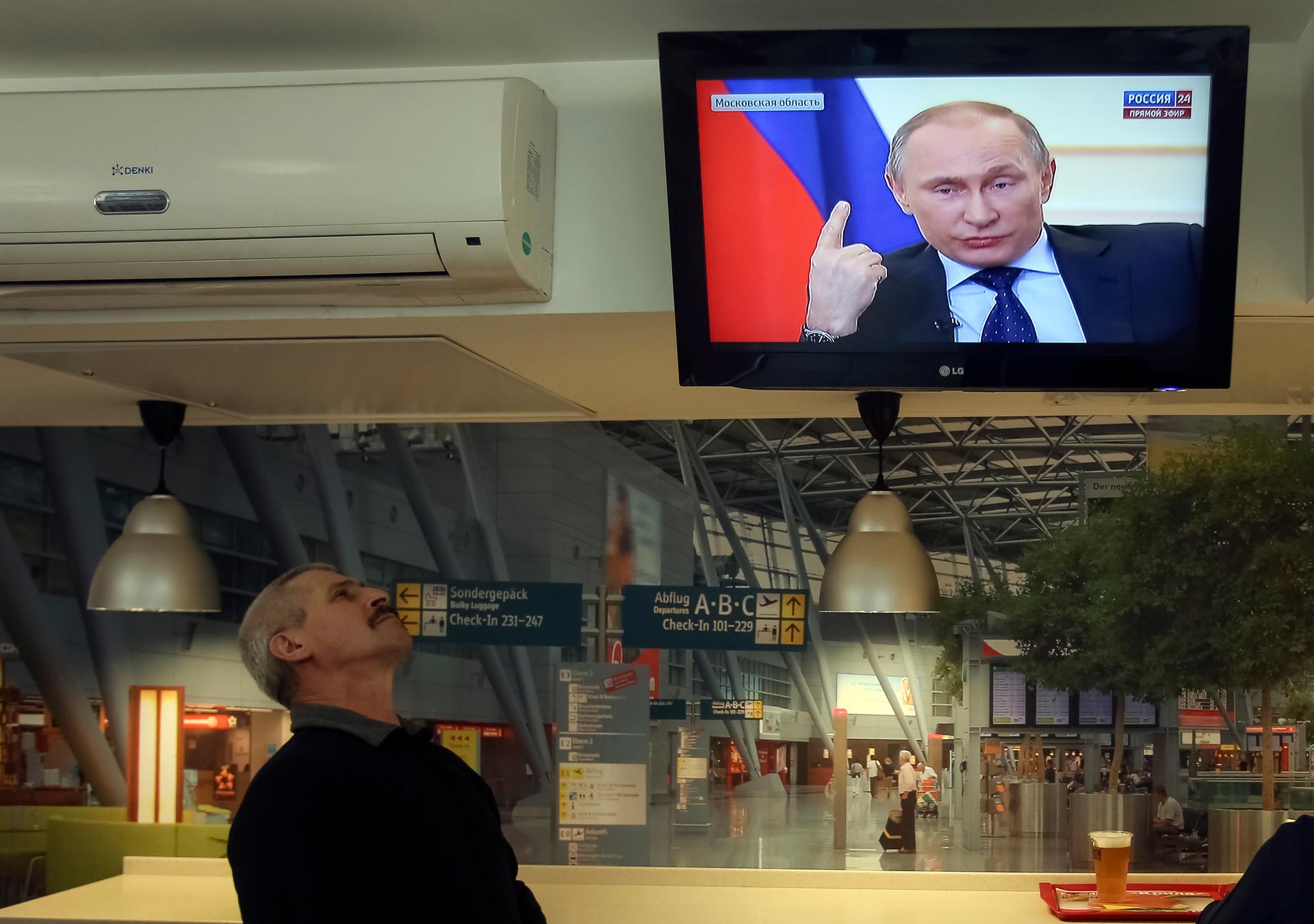Members of Ukraine’s Parliament beat a TV station chief for airing Putin
A local resident watches a TV broadcast of Russian President Vladimir Putin’s news conference, in Kiev.
Some members of Ukraine's Parliament seem to have played into the hands of Russian President Vladimir Putin, who claims that Ukraine's new government contains fascists.
In a clearly undemocratic move, MPs and activists from the far-right, anti-Russian Svoboda Party visited the offices of Ukraine’s state TV broadcaster on Tuesday. They filmed themselves confronting and beating the station’s chief executive, Oleksandr Panteleymonov, to get him to resign. They were allegedly angry over his decision to broadcast Putin's ceremony on Tuesday officially annexing the Crimea.
To make their feelings even clearer, they posted the footage online — and it is chilling. The TV executive has since resigned.
“It shows you the absolute thuggery that sometimes exists on the fringes of Ukrainian politics,” says Olexiy Solohubenko, who has been monitoring the situation in Ukraine for the BBC World Service.
Although none of the MPs in the video are officials in Ukraine’s government, the Svoboda party is part of the governing coalition and holds positions in the cabinet.
Ukraine's transitional government is mainly comprised of representatives from three parties, explains the BBC's Solohubenko. The bulk of the coalition is the left-of-center Fatherland Party — the party of former Prime Minister Yulia Timoshenko, who was jailed under Viktor Yanukovych’s rule. The second pary is UDAR — the more centrist party of boxing champion Vitali Klitschko. And the third party in the mix is the far-right Svoboda party.
“They believe what they believe is right," says Solohubenko, "that [airing] President Putin’s address will incite more separatism in eastern and southern Ukraine.”
The violence and repression of the press seem to contradict the message of what the Maidan protests were about: freedom, freedom of expression, and democratic rights.
Solohubenko thinks Ukraine's state-run media have been quite fair. “This ugly incident shouldn’t take away from the fact that Ukrainian media has been performing pretty well, reflecting lots of points of view, [the] point of view of protestors on Maidan, but the opposition as well."
Pro-Russian media has, unsurprisingly, been making much of the incident and the video.
Some members of Ukraine's Parliament seem to have played into the hands of Russian President Vladimir Putin, who claims that Ukraine's new government contains fascists.
In a clearly undemocratic move, MPs and activists from the far-right, anti-Russian Svoboda Party visited the offices of Ukraine’s state TV broadcaster on Tuesday. They filmed themselves confronting and beating the station’s chief executive, Oleksandr Panteleymonov, to get him to resign. They were allegedly angry over his decision to broadcast Putin's ceremony on Tuesday officially annexing the Crimea.
To make their feelings even clearer, they posted the footage online — and it is chilling. The TV executive has since resigned.
“It shows you the absolute thuggery that sometimes exists on the fringes of Ukrainian politics,” says Olexiy Solohubenko, who has been monitoring the situation in Ukraine for the BBC World Service.
Although none of the MPs in the video are officials in Ukraine’s government, the Svoboda party is part of the governing coalition and holds positions in the cabinet.
Ukraine's transitional government is mainly comprised of representatives from three parties, explains the BBC's Solohubenko. The bulk of the coalition is the left-of-center Fatherland Party — the party of former Prime Minister Yulia Timoshenko, who was jailed under Viktor Yanukovych’s rule. The second pary is UDAR — the more centrist party of boxing champion Vitali Klitschko. And the third party in the mix is the far-right Svoboda party.
“They believe what they believe is right," says Solohubenko, "that [airing] President Putin’s address will incite more separatism in eastern and southern Ukraine.”
The violence and repression of the press seem to contradict the message of what the Maidan protests were about: freedom, freedom of expression, and democratic rights.
Solohubenko thinks Ukraine's state-run media have been quite fair. “This ugly incident shouldn’t take away from the fact that Ukrainian media has been performing pretty well, reflecting lots of points of view, [the] point of view of protestors on Maidan, but the opposition as well."
Pro-Russian media has, unsurprisingly, been making much of the incident and the video.
Our coverage reaches millions each week, but only a small fraction of listeners contribute to sustain our program. We still need 224 more people to donate $100 or $10/monthly to unlock our $67,000 match. Will you help us get there today?
